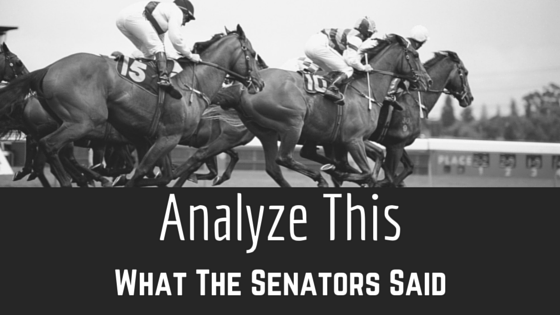Week 1: Venable LLP
We continue this week, with another comment filed with the Consumer Financial Protection Bureau related to the agency’s proposed rule regulating the debt collection industry.
At some point later this year or more likely early in 2016, the CFPB is expected to release its final rule related to debt collections. This will be the culmination of a process that started more than two years ago when the agency announced its intention to issue regulations for debt collectors.
In advance of that final rule, and as a means of gauging what the CFPB might be considering as it puts pen to paper, I thought it would be helpful to go back and look at the comments that were filed by interested parties looking to share their insights and opinion on the rule. So, from time to time, I’m going to pick a few comments and share them and open them up for discussion.
This week’s submission: What The Senators Said.
A group of seven Democratic senators got together and penned a letter to the CFPB as its comment to the proposed rule. Here is the letter, in its entirety. The commentary is mine.
We write regarding your Advanced Notice of Proposed Rulemaking (ANPR) on debt collection practices
Good. We’re all on the same page.
Repeatedly, we are presented with stories from our constituents about unfair, deceptive, and abusive behaviors by those seeking to collect on a debt.
Because nobody ever sends a Senator a note complimenting the good job that a debt collector did in getting someone to pay. And how many complaints have they received? Repeatedly isn’t good enough. The industry would not get away with such a benign description.
Thankfully, in many instances, the Fair Debt Collection Practices Act (FDCPA) imposes meaningful restrictions on the tactics that third-party debt collectors can employ and enshrines important rights that consumers can assert to protect themselves.
So why do we need a new rule?
In other cases, however, the protections, rights, and tools that consumers enjoy under the FDCPA may be insufficient in both strength and scope.
Spoke too soon.
Accordingly, we urge the Bureau to use its rulemaking to address the following issues in order to set tighter standards for debt-collection practices and to give consumers better tools to protect themselves.
Was this written by Senators or the FCC?
First, the Bureau should extend the FDCPA’s prohibitions on deceptive, harassing, and abusive communications to cover original creditors. Such communications practices that are already banned for third-party debt collectors – including but not limited to visits to home and workplaces, communication with third parties, caller ID masking, and repeated or late-night phone calls intended to harass – should also be off-limits for original creditors.
I don’t think anyone would disagree with that. Sounds simple enough.
We recognize that certain creditors, such as small financial institutions, have ongoing communications with their customers that may or may not involve debt collection. While new rules should allow for such routine and ongoing communication, no consumer should ever face the prospect of strangers knocking at their door or confronting them in front of bosses or coworkers in an effort to collect on a debt. These practices – along with all deceptive, harassing, and abusive tactics – are clearly over the line and should be banned for all debt collection, no matter who is doing the collecting.
If you’re leading with your strongest argument, this is going to be a boring letter.
Second, the Bureau should also pay special attention to strengthening the key protections for service members that may not currently apply to their dealings with original creditors. In recent testimony before the Senate Banking Committee, the Bureau’s Assistant Director of Servicemember Affairs, Holly Petraeus, related a particularly galling example of intimidation: collectors seeking to intimidate service members by contacting their commanding officers.
One example. Again, a lack of hard data on a point that is already against the law.
In the absence of servicemember’s expressed consent, we believe such actions would already be prohibited for debt collectors under the FDCPA’s limitations on communications with third parties. But we also urge the Bureau to explicitly ban such intimidation tactics for original creditors,as well as to tighten the rules governing whether, when, and how creditors can seek to secure such consent in advance through contracts.
We’re still not breaking any new ground. This is all just reiterating what’s already on the books. Maybe Page 2 will be better.
Third, even for third-party debt collectors already covered under the FDCPA, existing bans on unfair and deceptive practices must be strengthened to explicitly cover a number of misleading promises, threats, and traps. These include, but are not limited to (a) misleading consumers about the effect of payment or non-payment on their credit report; (b) seeking to collect on time-barred debt by threatening consumer with actions, such as lawsuits, that collectors are not legally entitled to take under state law; and (c) luring unsuspecting consumers into reviving their own liability for time-barred debt through partial payment or acknowledgement.
Again, I don’t think anyone will disagree that all of those things are bad and should not be allowed.
While the Bureau’s recent enforcement action against American Express for false claims about credit reporting was a step in the right direction, we urge the Bureau to go further in its rulemaking by explicitly prohibiting these and other deceptive practices.
Yawn
Fourth. we urge the Bureau to set higher standards for the information provided about debts by debt collectors. In many instances, particularly involving medical debt, collectors forward derogatory information to a consumer reporting agency before a consumer has even had a chance to learn or pay what they personally owe. We believe this should be categorized as an unfair practice as prohibited by Dodd-Frank.
Again with the “in many instances.” Being a Senator must be awesome because you never have to deal in hard facts. With regards to the reporting issue mentioned by the Senators, collection agencies usually get debt that is already been worked by first-party collectors. There has already been a chance to pay.
The Bureau should require collectors of medical debts – and other debts passed on to a debt collector or debt buyer more quickly than the standard 180 days – to provide consumers with specific information about the debt and a reasonable time to pay before communicating with consumer reporting agencies.
If I don’t pay my credit card bill on time, or my car loan, it gets reported back to the credit bureaus on day 31. Why should collectors wait five more months?
Fifth, consumers must be made better aware of their rights. When communicating by phone, collectors should be required to notify consumers orally of their rights to request an end to communication, dispute the debt, or refuse to pay a time-barred debt.
Sure. Let’s make the mini-miranda five minutes long and tell consumers how they can shirk their financial obligations. The next time that a politician calls me to influence me to vote for them, will they tell me I can vote for someone else?
To ensure consumers can understand the written information they receive, the Bureau should also write a clear, standard “Know Your Rights” disclosure that all collectors must provide to consumers upon their first written communication, and ideally before any oral communication.
Finally, when consumers do believe their rights have been violated, the Bureau’s rules should allow them to hold collectors accountable for each such violation. Given the FDCPA’s maximum statutory damages of merely $1,000 – unchanged since the law passed in 1977 – many debt collectors may now feel they have a financial incentive to be non-compliant in many cases. By making debt collectors liable for each individual violation, the Bureau will ensure that a strong incentive is in place to comply with the law.
Thank you for your attention to this matter. We commend the Bureau for taking on this issue, and look forward to working with you to ensure consumers are protected from deceptive, harassing, and abusive practices.
Sincerely,
Richard Blumenthal
Dick Durbin
Elizabeth Warren
Tom Udall
Mazie Hirono
Jeffrey Merkley
Edward Markey
This is where the Senators deliver their knock-out punch – a higher statutory penalty – but they refrain from giving any ideas or suggestions about what that number should be. The lack of specifics in this comment is stunning. There is no way to take this proposal seriously because it is one generality after the next. This is virtually the exact opposite of the comment that was profiled last week, which was so data-heavy that you needed a statistics degree to get through it.
SCORE: D









